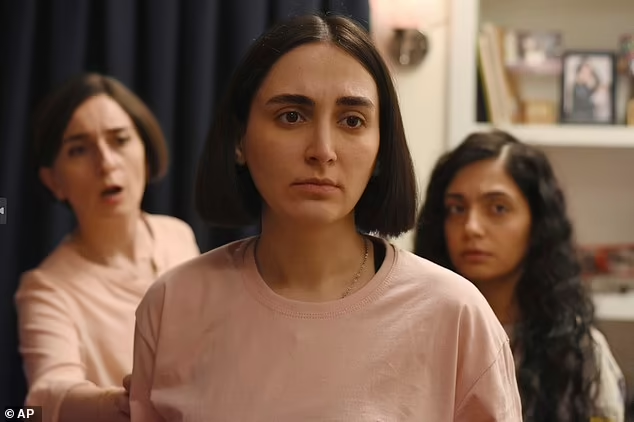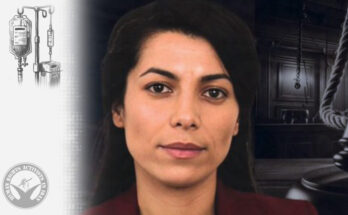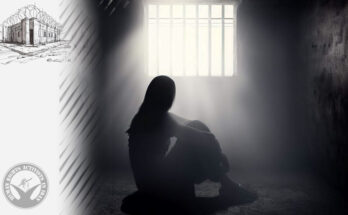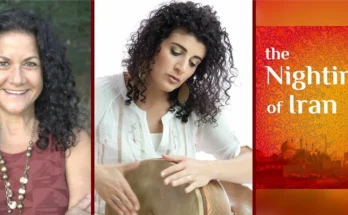Source: The Daily Mail

Tonight will see Hollywood’s biggest names take to the red carpet as they attend the industry’s most prestigious awards ceremony – the Oscars.
However, an actress who appeared in one of the nominated films will be missing from the list of guests.
Soheila Golestani, 44, was the leading lady in The Seed of the Sacred Fig, which aims to shine a spotlight on the moral corruption and tension in Iranian society. The picture is up for the international gong – but has been nominated as a German, rather than Iranian, film.
Because of her role in the movie, Soheila has been banned from leaving her Tehran home, and is facing charges of ‘spreading corruption on earth and propaganda against the regime’ at Iran‘s Revolutionary Court, reports the Times.
The punishment she could be facing is a year in prison and 74 lashes.
It wouldn’t be the first time Soheila has seen the inside of a cell: two years ago, she was held in Evin prison, which is used to incarcerate political prisoners, and which has made headlines due to footage showing inmates being tortured, interrogated for hours on end and repeatedly threatened with execution.
She was held at the facility after posting a video in solidarity with the Woman, Life, Freedom protests, which took place in the country after the death of Mahsa Amini, who died while in custody in September 2022.
In the video, Soheila (alongside other actresses) removes her hijab – which is compulsory in Iran – before staring into the camera lens.
Last May, after the death of president Ebrahim Raisi, her co-stars and the film’s director, Mohammad Rasoulof, fled Iran when the curfew was briefly lifted.
But Soheila was unable to flee, as she was undergoing surgery.
Speaking about it, the actress told the Times: ‘I got stranded because of my operation. But leaving your home and land is a personal decision, as unique to each person as their fingerprints. And I wanted to stay and face the impact of what I had done and my right to do it.’
Discussing her absence from the film circuit, she said it would have been an ‘amazing opportunity’ to attend the Oscars, but that she was was to see the movie earn ‘prestige and visibility’. The actress added that the cast and crew in attendance would be ‘like my presence there’.
Director Mohammad Rasoulof – who has been incarcerated previously due to his work – had been facing an eight-year custodial sentence before he fled Iran, because of the picture’s critique of the Iranian regime.
In The Seed of the Sacred Fig, Soheila plays the role of Najmeh, a woman who is married to a regime official called Imam.
After being promoted to an investigator, one of Imam’s duties is to sign death warrants, despite them not being supported by any evidence.
This causes Najmeh to feel conflicted: on the one hand are the benefits of the promotion, like a bigger income, however, on the other hand are the issues caused by the regime, like the protests on the streets.
According to Soheila, she experienced ‘conflicting feelings’ while performing in the film, adding that it was ‘like nothing I had ever experienced’.
Despite it being a dangerous project to be part of, she says she agreed to the role ‘because of the importance of making such a film at such an important time in our history and social environment’. In addition, she said, was the opportunity to play a ‘real female character’ – something which has been absent so far from Iranian screens.
The production took a number of precautions to ensure they would be safe shooting exterior shots. For example, they had two scripts – the version they were shooting, and an officially approved version that they could switch to if encountering anyone.
Speaking to Channel 4 about how the crew had avoided detection from the authorities when filming outdoors, director Mohammad Rasoulof said: ‘A funny thing was that the story of the film involves a religious family which at a glance looks very much like the families shown in state television programmes. So when people saw the group at work they assumed it was a state project and people started swearing at the actors, saying “Shame on you for working with the regime,”.’
The film, which won the special jury prize at Cannes, is, according to its director ‘about surrender’.
He told Channel 4: ‘It’s about the people who work in authoritarian systems, who have human characteristics and features, but become part of the machinery of suppression.’
Film has become an important part of the resistance, with the director telling the Times: ‘Making underground films has become something of a culture in Iran for directors like me who don’t want to submit to censorship. Every time we have to find a new way to do it as they [the regime] work out the ways we have used before.’
However, the danger inherent in making such work means that those involved can face harsh punishments.
Mohammad Rasoulof, who fled Iran on foot through the mountains, told the Times he is ‘very worried’ about Soheila, because she is under pressure trapped in Iran.
However, he added, she has ‘no regrets’. The director said everyone made a decision when they agreed to work on the production to be prepared for any consequence.
The regime’s response to the picture, whether it is a ‘violent reaction or silence’, is the least important thing, according to the director.
The Seed of the Sacred Fig has been nominated for the Academy Award for Best International Feature Film.




